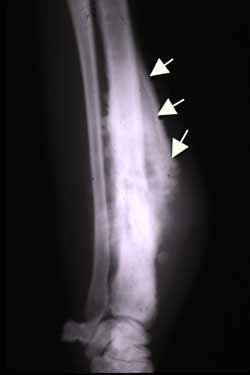Osteosarcoma: Bone Tumors
- posted: Nov. 20, 2016
 Cancer Series: November is Cancer Awareness Month for Pets
Cancer Series: November is Cancer Awareness Month for Pets
Osteosarcoma
Osteosarcoma is a cancer of the bones. It most often occurs in the long bones of older, large breed dogs. Patients will have intermittent to chronic lameness that does not respond well to pain medications. In later stages of the disease, there is usually swelling around the abnormal bone and ulceration or pathologic fractures can occur. Osteosarcomas can also occur on the skull, trunk or spine, though this is much less common. This tumor can also occur in cats, but it is rare.
By the time most osteosarcomas have been found, the tumor has most likely already spread to the lungs. Bone tumors are diagnosed by taking radiographs (x-rays) of the affected bone. Lysis or destruction of the bone is usually evident. A biopsy of the bone may be performed to confirm osteosarcoma. Other tumors or fungal infection of the bone may have a similar appearance.
The goal of treating osteosarcoma is to alleviate pain and stay ahead of metastatic disease. Pain control may be difficult with medication alone. Often, amputation of the affected limb is recommended as it removes the painful bone and may help to reduce spread of the cancer. While this sounds like a radical solution and a scary prospect, dogs adapt quickly and remarkably well to having only three legs and they do not have any negative stigmas attached to losing a leg as we humans often do. Post-surgical chemotherapy may also be used to help reduce cancer spread. Radiation therapy is also sometimes used.
Survival times vary from four to six months in patients who have no treatment or surgery only to treat their osteosarcoma. The survival time with chemotherapy may be as long as one to three years. While osteosarcomas are aggressive tumors and can cause a great deal of pain, surgical amputation of the affected limb and appropriate chemotherapy provide reasonable survival times for affected pet and there is ongoing research into new treatments such as immunotherapy (cancer vaccines).
This blog is brought to you by the Patton Veterinary Hospital serving Red Lion, York and the surrounding communities.
Source: www.veterinarypartner.com
Location
Patton Veterinary Hospital
425 E Broadway
Red Lion, PA 17356
